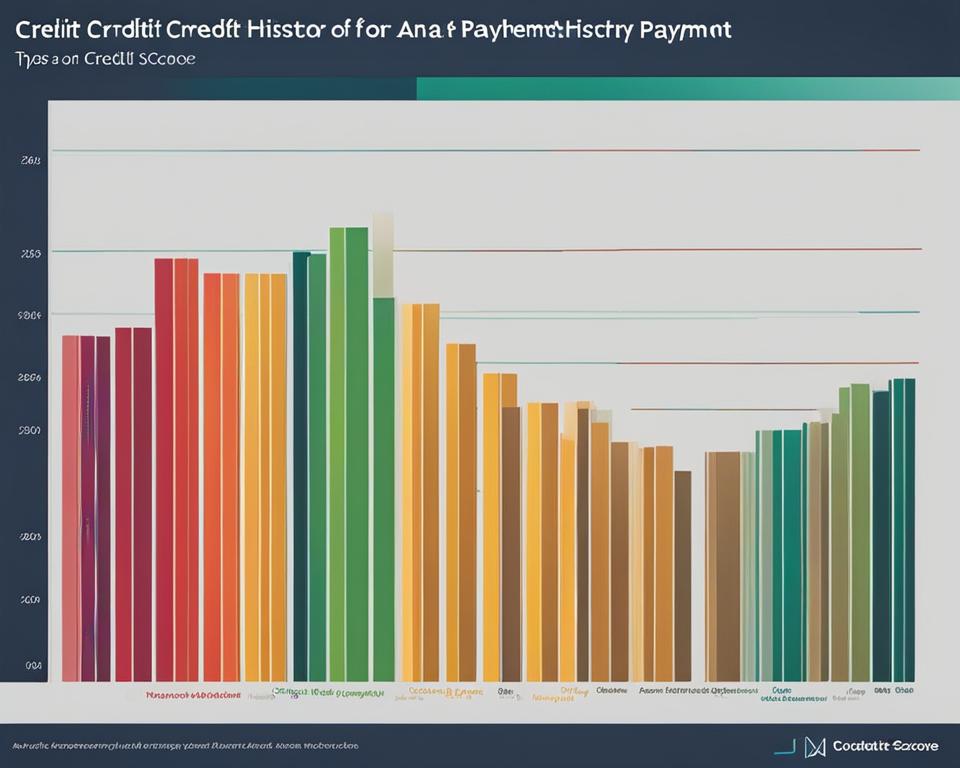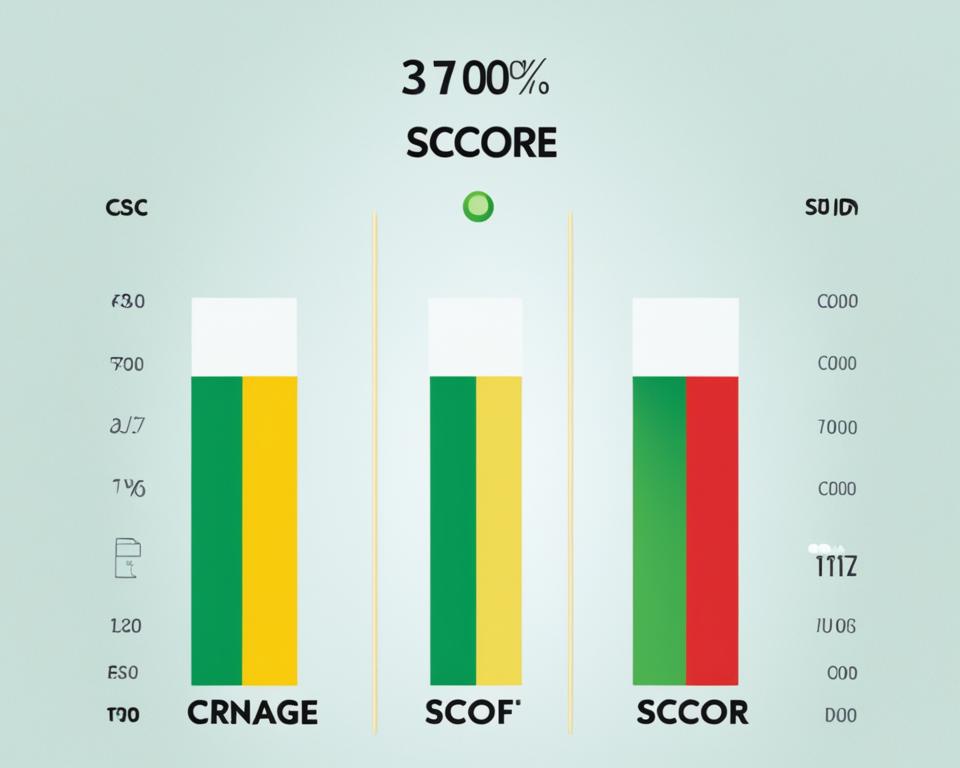A good credit score is crucial when it comes to securing favorable financial opportunities. Whether you’re applying for a loan, renting an apartment, or even getting a new job, your credit score plays a significant role in determining your creditworthiness.
But how much credit score is considered good? Let’s explore the optimal credit score range and what is considered a good credit score.
Key Takeaways:
- A good credit score is generally considered to be 700 or above on a range of 300 to 850.
- An excellent credit score is 800 or above.
- The average FICO® Score in the U.S. in 2022 is 714.
- Most consumers have credit scores between 600 and 750.
What Is a Good FICO Score?
A good FICO® Score is an important factor in determining your creditworthiness. Lenders across various industries use FICO® Scores, which range from 300 to 850, to assess your creditworthiness. When it comes to a good FICO® Score, a range of 670 to 739 is considered favorable.
To better understand the significance of a good FICO® Score, let’s take a closer look at the credit score range:
| Credit Score Range | Credit Rating |
|---|---|
| 300 – 579 | Poor |
| 580 – 669 | Fair |
| 670 – 739 | Good |
| 740 – 799 | Very Good |
| 800 – 850 | Excellent |
Having a good FICO® Score demonstrates to lenders that you are financially responsible and capable of managing credit. It increases your chances of being approved for loans, credit cards, and favorable interest rates. With a good credit score, you can enjoy better financial opportunities and save money on interest over time.
It’s important to note that while the specific credit score range for a good FICO® Score may vary slightly depending on the lender or industry, the general goal is to aim for a score in the range of 670 to 739 for optimal creditworthiness.
What Is a Good VantageScore?
A good credit score is an important factor when it comes to accessing favorable financial opportunities. In addition to the well-known FICO® Score, there is another credit scoring model called VantageScore that lenders use to assess creditworthiness. But what exactly is considered a good VantageScore?
To answer that question, a good VantageScore is generally considered to be between 661 and 780. VantageScore 3.0 and 4.0, the two most recent versions of the scoring model, use the same credit score range as FICO® Scores, which is 300 to 850. Within this range, VantageScore defines the range of 661 to 780 as good.
When you have a good VantageScore, it indicates that you have a credit history that is viewed positively by lenders. This can increase your chances of being approved for credit cards, loans, and other financial products. It also puts you in a better position to negotiate favorable terms and access lower interest rates.
It’s important to keep in mind that credit score ranges can vary depending on the scoring model used by lenders. However, having a good VantageScore is generally seen as a positive indicator of your creditworthiness.
Comparing VantageScore and FICO® Score
While both VantageScore and FICO® Score use the same credit score range, there are some differences in how they calculate credit scores. These differences can result in variations in your credit scores between the two models. However, the overall assessment of what constitutes a good credit score remains similar.
According to the latest data, the average VantageScore in the U.S. is 695, indicating that many individuals fall within the good credit score range.
It’s essential to monitor both your VantageScore and FICO® Score regularly to have a comprehensive understanding of your credit standing. This allows you to address any discrepancies or areas of improvement to increase your overall creditworthiness.
| VantageScore | Credit Score Range |
|---|---|
| Excellent | 781-850 |
| Good | 661-780 |
| Fair | 601-660 |
| Poor | 500-600 |
| Very Poor | 300-499 |
Source: Data compiled from various credit scoring resources.
Keep in mind that these credit score ranges are not set in stone and can vary slightly between lenders and industries. Additionally, other factors such as your credit history, income, and employment status may also influence lending decisions.
Importance of Having a Good Credit Score
A good credit score plays a crucial role in an individual’s financial health. It opens doors to various opportunities, such as qualifying for credit cards or loans with lower interest rates and better terms. Lenders rely on credit scores to assess the risk of lending to an individual and determine the interest rate and payment terms for a loan.
By maintaining a good credit score, individuals demonstrate their financial responsibility and enhance their chances of obtaining credit at favorable terms. Whether it’s a mortgage, car loan, or credit card, a good credit score can save you money over time.
A good credit score allows you to secure:
- Lower Interest Rates: With a good credit score, you are more likely to qualify for loans with lower interest rates. This can result in substantial savings, especially for long-term loans like mortgages.
- Better Loan Terms: Lenders often offer more favorable loan terms, such as longer repayment periods or lower down payment requirements, to borrowers with good credit scores.
- Access to More Credit Options: Having a good credit score expands your options when it comes to credit cards and loans. You can choose from a wider range of lenders and products, giving you greater flexibility to meet your financial needs.
Overall, a good credit score is a reflection of your financial health and responsible credit management. It demonstrates to lenders that you are a reliable borrower who is likely to repay debts on time. This trust allows you to enjoy the benefits of lower interest rates and better terms.
“A good credit score is essential for qualifying for credit cards or loans with lower interest rates and better terms.”
Building and maintaining a good credit score requires consistent financial discipline, such as making timely repayments, keeping credit card balances low, and managing debt responsibly. It’s an ongoing process that can pay off in the form of better financial opportunities.
How a Good Credit Score Impacts Your Financial Life
A good credit score not only helps you secure better financial terms but also impacts various aspects of your financial life. Here are some key ways a good credit score can benefit you:
| Benefits of Having a Good Credit Score |
|---|
| 1. Higher Chance of Loan Approval |
| 2. Lower Interest Rates and Monthly Payments |
| 3. Access to Premium Credit Cards and Rewards Programs |
| 4. Negotiating Power for Better Deals |
| 5. Approval for Rental Applications |
| 6. Lower Insurance Premiums |
As you can see, a good credit score has far-reaching implications beyond simply obtaining credit. It can positively impact your ability to rent an apartment, secure lower insurance premiums, and access premium credit card rewards programs. It’s a valuable asset that enhances your overall financial stability and opens doors to a world of financial opportunities.
How to Improve Your Credit Score
To improve your credit score, there are several strategies you can implement to help boost your creditworthiness. By focusing on these key areas, you can gradually improve your credit score over time.
1. Make On-Time Payments
One of the most important factors influencing your credit score is your payment history. To improve your credit score, ensure that you make all your bill payments on time. Late payments can have a negative impact on your credit score, so it’s crucial to prioritize paying your bills by their due dates.
2. Reduce Credit Card Balances
Your credit utilization ratio, which is the amount of credit you’re using compared to your available credit, is another important factor in determining your credit score. Aim to keep your credit card balances low and avoid maxing out your cards. Paying down your balances can help improve your credit score.
3. Maintain a Mix of Credit Types
Having a diverse mix of credit accounts, such as credit cards, installment loans, and a mortgage, can positively impact your credit score. Lenders like to see that you can responsibly manage different types of credit. If you only have one type of credit account, such as credit cards, consider diversifying your credit profile by adding other types of credit.
4. Avoid Opening Too Many New Accounts
Opening multiple new credit accounts within a short period can raise red flags for lenders and may negatively impact your credit score. Each time you apply for new credit, it results in a “hard inquiry” on your credit report, which can slightly lower your score. Only open new accounts when necessary and be mindful of how frequently you’re applying for credit.
5. Monitor Your Credit Report Regularly
Stay proactive about monitoring your credit report to identify any errors or fraudulent activities that may be negatively impacting your credit score. By law, you are entitled to a free copy of your credit report from each of the three major credit bureaus once every 12 months. Review your credit report regularly and dispute any inaccuracies you find.
“Improving your credit score requires consistent effort and responsible credit management. By implementing these tips, you can take control of your creditworthiness and work towards achieving a higher credit score.”
Implementing these tips can have a positive impact on your credit score over time. By focusing on making on-time payments, reducing credit card balances, maintaining a mix of credit types, and avoiding opening too many new accounts, you can gradually improve your creditworthiness. Remember, improving your credit score is a journey that requires patience and perseverance.
See the table below for a summary of these tips:
| Tips for Improving Your Credit Score |
|---|
| Make on-time payments |
| Reduce credit card balances |
| Maintain a mix of credit types |
| Avoid opening too many new accounts |
| Monitor your credit report regularly |
Credit Score Requirements for Buying a House
To increase your chances of approval and qualify for a lower-rate mortgage, aim for a credit score in the good range, which is generally considered to be 670 or higher. Different types of mortgages may have different credit score requirements, such as a minimum score of 620 for a conventional mortgage, 500 or 580 for FHA loans, and 580 or higher for USDA loans. Improving your credit score before applying for a mortgage can result in better loan terms.
When buying a house, your credit score plays a crucial role in determining your ability to obtain a mortgage and secure favorable terms. Lenders use your credit score as an indicator of your creditworthiness – a higher credit score signifies a lower risk borrower.
For a home loan, a good credit score is generally considered to be 670 or higher. This indicates to lenders that you have a history of responsible credit management and are more likely to repay your mortgage on time.
Different types of mortgages may have varying credit score requirements, so it’s essential to understand the minimum credit score needed for each loan type:
| Mortgage Type | Minimum Credit Score |
|---|---|
| Conventional Mortgage | 620 or higher |
| FHA Loan | 500 or 580, depending on down payment |
| USDA Loan | 580 or higher |
It’s important to note that while these are the minimum credit score requirements, having a score in the good range (670 or higher) increases your chances of approval and may result in better loan terms.
Improving your credit score before applying for a mortgage can have a significant impact on the interest rate and loan terms you receive. By taking steps to build your credit and maintain a good credit history, you can potentially save thousands of dollars over the life of your mortgage.
Remember, a higher credit score demonstrates financial responsibility and makes you a more attractive borrower to lenders. So, it’s worth investing time and effort into improving your credit before embarking on your homeownership journey.

Takeaways:
- Aim for a credit score in the good range (670 or higher) when buying a house.
- Minimum credit score requirements vary based on the type of mortgage.
- Improving your credit score can result in better loan terms and lower interest rates.
- Investing in your credit before applying for a mortgage can save you money over time.
Credit Score Requirements for Buying a Car
When it comes to buying a car, having a good credit score can make a significant difference in securing an auto loan with favorable terms. While there is no specific minimum credit score required to buy a car, aiming for a score of 670 or higher puts you in the good credit range and increases your chances of qualifying for better auto loan options.
A higher credit score indicates to lenders that you are a responsible borrower, which translates to lower risk for them. As a result, you may be offered lower interest rates and more favorable loan terms, such as longer repayment periods or smaller down payments.
It’s important to note that different lenders may have varying credit score requirements depending on their lending criteria. However, aiming for a credit score of 670 or higher is generally recommended for maximizing your chances of getting the best auto loan options available.
By maintaining a good credit score, you not only increase your chances of loan approval but also gain access to better auto loan terms, potentially saving you money in the long run. With lower interest rates, you’ll pay less in interest over the life of the loan, resulting in a more affordable car purchase.
Remember, a good credit score for buying a car is a reflection of your financial responsibility and can open doors to better loan opportunities. So, if you’re planning to buy a car, it’s worth taking the time to improve your credit score or maintain a good score to secure the best auto loan terms possible.
| Credit Score Range | Loan Terms & Interest Rates | Qualification |
|---|---|---|
| Below 580 | High interest rates, limited loan options | Difficult to qualify |
| 580 – 669 | Higher interest rates, limited loan options | Possible qualification |
| 670 – 739 | Competitive interest rates, wider range of loan options | Good qualification |
| 740 or higher | Lowest interest rates, extensive loan options | Excellent qualification |
As the table demonstrates, a good credit score falls within the range of 670 to 739, indicating good qualification for auto loans with competitive interest rates and a wider range of loan options. However, an even higher credit score can further enhance loan terms and options.
Remember to monitor your credit score regularly and take steps to improve it if needed. By doing so, you’ll increase your chances of securing the best possible auto loan terms, making your car purchase more affordable and enjoyable.
Factors Affecting Your Credit Scores
Several factors play a significant role in determining your credit scores. These factors include payment history, credit usage, length of credit history, types of accounts, and recent activity. Understanding how these factors influence your credit scores can help you make informed decisions to improve your financial health.
Payment History
Your payment history holds substantial weight when it comes to calculating your credit scores. Making on-time payments consistently demonstrates your responsible credit behavior and can positively impact your scores. On the other hand, missed or late payments can negatively affect your credit scores and indicate a higher level of risk to lenders.
Credit Usage
Another crucial factor in credit score calculation is your credit usage or credit utilization ratio. This ratio is the percentage of your available credit that you are using. Keeping your credit card balances low in relation to your credit limits shows responsible credit management and can have a positive effect on your scores. High credit card balances, on the other hand, can indicate financial strain and may negatively impact your scores.
Length of Credit History
The length of your credit history is also considered in credit score calculations. Generally, a longer credit history is seen as more favorable because it provides a more comprehensive view of your credit management habits. If you have a limited credit history, it may be beneficial to maintain older accounts and avoid closing them, as they contribute to the overall length of your credit history.
Types of Accounts
The types of accounts you have also play a role in determining your credit scores. Maintaining a diverse mix of credit accounts, such as credit cards, loans, and mortgages, can demonstrate your ability to handle different types of credit responsibly. A healthy mix of accounts can positively impact your credit scores. However, it’s essential to remember that opening too many new accounts within a short period can have a negative effect on your scores.
Recent Activity
Your recent credit activity is another factor that can affect your credit scores. Opening multiple new accounts or applying for credit frequently within a short timeframe can indicate a higher level of risk and may negatively impact your scores. It’s important to be mindful of your credit utilization and recent credit applications to maintain a healthy credit profile.
By considering these factors and adopting responsible credit habits, such as making on-time payments, keeping credit card balances low, and avoiding excessive credit applications, you can work towards improving your credit scores over time.

| Factors Affecting Credit Scores | Impact on Credit Scores |
|---|---|
| Payment History | Significant impact; on-time payments improve scores, while missed or late payments lower scores. |
| Credit Usage | High credit utilization negatively affects scores, while keeping balances low has a positive impact. |
| Length of Credit History | Older accounts and longer credit history contribute positively to scores. |
| Types of Accounts | A diverse mix of credit accounts can positively influence scores. |
| Recent Activity | Opening too many new accounts or frequent credit applications can harm scores. |
FICO vs VantageScore: Understanding Credit Scoring Models
When it comes to assessing creditworthiness, lenders rely on credit scoring models such as FICO and VantageScore. Understanding how these models work is crucial for navigating the world of credit and loans.
FICO Scores:
FICO® Scores, ranging from 300 to 850, have been a staple in the credit industry for years. Developed by Fair Isaac Corporation, FICO® Scores are widely used by lenders to evaluate creditworthiness. These scores consider factors such as payment history, credit usage, and length of credit history. A higher FICO® Score indicates lower risk to lenders.
VantageScore:
Introduced as an alternative to FICO Scores, VantageScore also uses the range of 300 to 850. VantageScore 3.0 and 4.0, the newest models, consider similar factors as FICO Scores, including payment history, credit usage, and length of credit history. However, VantageScore may weigh these factors differently. The goal of VantageScores is to offer a competitive credit scoring model that can complement traditional FICO Scores.
“Both FICO Scores and VantageScores provide lenders with insights into an individual’s creditworthiness, but they may differ in their calculations and weightings.”
Which Model Is Used?
Different lenders may choose to use either FICO Scores or VantageScores, or even both. The decision is often based on the lender’s preference and industry standards. It’s essential to note that your credit scores may vary depending on the model used by a particular lender.
Understanding Your Credit Scores
To gain a comprehensive view of your creditworthiness, it’s essential to monitor both your FICO Scores and VantageScores. Regularly checking your credit scores can help you identify any potential issues or discrepancies. Additionally, understanding the factors that impact your scores allows you to make informed financial decisions and work towards improving your creditworthiness.
Comparing FICO Scores and VantageScores:
| FICO Scores | VantageScores | |
|---|---|---|
| Score Range | 300-850 | 300-850 |
| Factors Considered | Payment history, credit usage, length of credit history, credit mix, new credit | Payment history, credit usage, length of credit history, credit mix, new credit |
| Differences | Weighs factors differently | Weighs factors differently |
Ultimately, maintaining good credit behavior and practicing responsible financial habits will benefit your credit scores, regardless of whether they are FICO Scores or VantageScores. Paying bills on time, keeping credit card balances low, and using credit responsibly are key factors to secure healthy credit scores and gain access to favorable loan terms.
Credit Scores and What They Do Not Consider
Credit scores play a crucial role in determining an individual’s creditworthiness and financial health. However, it’s important to understand that credit scores have their limitations and don’t take into account certain factors that may be relevant to an individual’s financial situation.
Firstly, credit scores do not consider factors such as race, age, salary, or where you live. The use of these factors in credit scoring formulas is prohibited by U.S. law, as they can potentially lead to discrimination. The focus of credit scoring models is solely on the individual’s credit history and their ability to manage credit responsibly.
Additionally, credit scores do not consider soft inquiries. Soft inquiries occur when someone checks your credit report for reasons other than a credit application, such as a background check or pre-approved offers. These inquiries have no impact on your credit scores and are not taken into account in credit scoring models.
It’s important to note that while credit scores are an important tool for lenders to assess creditworthiness, they are not the only factor considered in lending decisions. Lenders may also evaluate additional information such as income, employment history, and the purpose of the loan when making lending decisions. However, these factors are not included in the calculation of credit scores.
Here is a summary of factors not considered in credit scores:
- Race
- Age
- Salary
In conclusion, credit scores provide valuable insight into an individual’s creditworthiness, but they do not consider factors such as race, age, salary, or soft inquiries. While credit scores are an important factor in the lending process, lenders may consider additional information when making lending decisions.

Why a Perfect Credit Score Isn’t Necessary
While achieving a perfect credit score of 850 may seem enticing, it offers no additional benefits compared to having a good credit score of 760 or above. Lenders view borrowers with scores in the 760 and above range as lower-risk and more likely to repay their debts. This means that the best interest rates and terms for loans are generally available to those with a credit score of 760 or higher.
Having a good credit score, even if it’s not perfect, comes with a range of benefits. It opens up opportunities for accessing credit cards, loans, and financial products with favorable terms. With a good credit score, you are more likely to be approved for credit, enjoy lower interest rates, and have more negotiating power in financial transactions.
Here are some of the benefits of having a good credit score:
- Lower interest rates: Lenders offer lower interest rates to borrowers with good credit scores. This means that you’ll pay less in interest charges over the life of a loan, saving you money.
- Greater borrowing power: A good credit score increases your chances of being approved for larger loan amounts, giving you the ability to make major purchases or investments.
- Access to credit cards with attractive rewards: Many credit card issuers reserve their most lucrative rewards programs for customers with good credit scores. This means you can enjoy perks such as cash back, travel rewards, and other valuable benefits.
- Higher credit limits: With a good credit score, you’re more likely to be granted higher credit limits on credit cards, providing you with more financial flexibility.
- Improved rental prospects: Landlords, particularly those who manage rental properties in desirable locations or upscale communities, often conduct credit checks on prospective tenants. A good credit score can increase your chances of being approved for the rental property of your choice.
Remember, a perfect credit score may not be necessary to enjoy these benefits. By consistently maintaining a good credit score of 760 or above, you can position yourself as a financially responsible individual and take advantage of a wide range of opportunities.
How to Check Your Credit Score for Free
Checking your credit score is an important step in assessing your financial health and understanding your creditworthiness. Fortunately, there are several free credit score services that can provide you with this valuable information. By utilizing these services, you can stay informed about your credit status and make informed decisions about your financial future.
One option for checking your credit score for free is through credit card issuers. Many credit card companies offer free credit score access as a benefit to their cardholders. Simply log in to your credit card account online or through their mobile app to access your credit score. This convenient and easy-to-use service allows you to keep track of changes in your score over time.
Another way to obtain your credit score for free is by requesting a copy of your credit report from each of the three major credit bureaus. You can do this once every 12 months through AnnualCreditReport.com. This official website provides you with the ability to download your credit report from Experian, Equifax, and TransUnion, giving you a comprehensive view of your credit history.
Monitoring your credit score regularly can help you track your progress and identify any potential errors or issues on your credit report. By staying on top of your credit, you can take steps to improve your score and enhance your financial well-being.
Benefits of Checking Your Credit Score for Free:
- Access to your credit score without incurring any costs
- Ability to monitor changes in your score over time
- Identification of any errors or discrepancies on your credit report
- Opportunity to take proactive steps to improve your creditworthiness
“By checking your credit score for free, you can take control of your financial future and make informed decisions about credit and loans.”
By taking advantage of free credit score services, you can gain valuable insights into your creditworthiness and take steps to improve your financial situation. Whether through your credit card issuer or by requesting your credit report, checking your credit score regularly is an essential practice for achieving and maintaining a healthy credit profile.
| Free Credit Score Services | Features |
|---|---|
| Credit Card Issuers | Access your credit score online or through mobile apps |
| AnnualCreditReport.com | Request free credit reports from Experian, Equifax, and TransUnion |
Checking your credit score for free is a crucial step in managing your financial well-being. By utilizing the available services, you can stay informed, make informed decisions, and work towards achieving a better credit profile.
Importance of Having a Good Credit Score
Having a good credit score is crucial for individuals looking to access the best credit cards, loans, and interest rates. A good credit score serves as a reflection of responsible credit behavior and opens up opportunities for qualifying for credit and securing favorable terms.
With a good credit score, you have a higher chance of qualifying for credit cards that come with attractive rewards programs. These rewards can range from cashback offers to travel benefits, allowing you to make the most of your spending. Additionally, a good credit score enables you to obtain lower interest rates on loans, which can save you significant money over time.
Furthermore, a good credit score provides you with more negotiating power when it comes to financial transactions. Whether you’re applying for a mortgage, negotiating a car loan, or seeking favorable terms on a personal loan, having a good credit score increases your leverage and enhances your ability to secure the best terms available in the market.
By maintaining a good credit score, you can benefit from:
- Access to credit cards with lucrative rewards programs
- Lower interest rates on loans
- Increased negotiating power for favorable terms
Quote:
“A good credit score is like a key that unlocks numerous financial opportunities, allowing individuals to access credit on more favorable terms and reap the rewards of responsible credit behavior.”
So, make it a priority to establish and maintain a good credit score. By practicing responsible credit habits, such as making payments on time, managing credit utilization, and avoiding excessive debt, you can ensure that your credit score remains in the desirable range.
| Credit Score Range | Credit Rating |
|---|---|
| 800 – 850 | Excellent |
| 670 – 799 | Good |
| 580 – 669 | Fair |
| 300 – 579 | Poor |

Credit Score Improvement Tips
Improving your credit score is crucial for better financial opportunities and increased creditworthiness. By implementing effective strategies and credit building techniques, you can gradually enhance your credit score over time. Follow these tips to improve your credit score:
1. Pay Bills on Time
One of the most important credit score improvement strategies is consistently making on-time payments. Late payments can have a negative impact on your credit score, so ensure that you pay all your bills, including credit card payments, loans, and utilities, by their due dates.
2. Keep Credit Card Balances Low
To improve your credit score, it’s essential to keep your credit card balances low. Aim to use a maximum of 30% of your available credit limit. High credit utilization can negatively affect your credit score, so regularly monitor and manage your credit card balances.
3. Pay Off Debts
Paying off outstanding debts can significantly improve your credit score. Focus on paying down your debts, such as credit card balances, personal loans, or student loans. By reducing your overall debt, you demonstrate responsible credit management and positively impact your credit score.
4. Avoid New Credit Applications
Opening multiple new credit accounts within a short period can lower your credit score. Avoid unnecessary credit applications, as each application typically results in a hard inquiry, which can temporarily reduce your credit score. Only apply for credit when necessary.
5. Monitor and Dispute Errors
Regularly monitor your credit reports for errors or inaccuracies. Mistakes on your credit reports can lower your credit score. If you find any errors, dispute them with the credit bureaus to have them rectified. Reviewing your reports regularly ensures the accuracy of your credit information.
6. Utilize Credit Boosting Tools
Consider utilizing tools like Experian Boost to potentially improve your credit score. Experian Boost allows you to connect your utility and telecom accounts to your credit report, potentially boosting your score by considering additional positive payment history.
| Credit Score Improvement Tips |
|---|
| Pay bills on time |
| Keep credit card balances low |
| Pay off debts |
| Avoid new credit applications |
| Monitor and dispute errors |
| Utilize credit boosting tools |
By incorporating these credit score improvement strategies into your financial habits, you can enhance your creditworthiness and increase your chances of qualifying for better loan terms, competitive interest rates, and improved financial opportunities.
Conclusion
In conclusion, maintaining a good credit score is essential for accessing favorable financial opportunities. A good credit score can lead to lower interest rates on loans, better credit card rewards, increased approval odds, and more negotiating power. By understanding the factors that impact credit scores and practicing responsible credit behaviors, individuals can improve their credit scores and achieve long-term financial health.
FAQ
How much credit score is considered good?
A good credit score is generally considered to be 700 or above on a range of 300 to 850.
What is the credit score range for a good FICO Score?
A good FICO Score is considered to be between 670 and 739.
What is the credit score range for a good VantageScore?
A good VantageScore is considered to be between 661 and 780.
Why is having a good credit score important?
Having a good credit score is important for qualifying for credit cards or loans with lower interest rates and better terms.
How can I improve my credit score?
To improve your credit score, focus on making on-time payments, reducing credit card balances, maintaining a mix of credit types, and avoiding opening too many new accounts.
What credit score do I need to buy a house?
To increase your chances of approval and qualify for a lower-rate mortgage, aim for a credit score in the good range, which is generally considered to be 670 or higher.
What credit score do I need to buy a car?
While there is no set minimum credit score to buy a car, aiming for a score of 670 or higher puts you in the good credit range and increases your chances of qualifying for better auto loan terms.
What factors affect credit scores?
Several factors impact your credit scores, including payment history, credit usage, length of credit history, types of accounts, and recent activity.
What is the difference between FICO and VantageScore?
FICO and VantageScore are two different credit scoring models used by lenders to assess creditworthiness.
What factors do credit scores not consider?
Credit scores do not take into account factors such as race, age, salary, and where you live.
Is it necessary to have a perfect credit score?
While achieving a perfect credit score of 850 may seem enticing, it offers no additional benefits compared to having a good credit score of 760 or above.
How can I check my credit score for free?
You can check your credit score for free using services provided by credit card issuers or credit bureaus.
Why is having a good credit score important?
Having a good credit score is important for accessing the best credit cards, loans, and interest rates.
How can I improve my credit score?
To improve your credit score, focus on paying bills on time, keeping credit card balances low, paying off debts, and avoiding new credit applications.
Why is it necessary to monitor credit scores?
Monitoring your credit score regularly can help you track your progress and identify any potential errors or issues on your credit report.





